Transcript of a Press Conference on the interim World Economic Outlook
December 18, 2001
World Economic Outlook December 2001 Taped Proceedings - WEO Press Conference, December 18, 2001 Other issues of the World Economic Outlook Transcripts Argentina and the IMF Brazil and the IMF India and the IMF Japan and the IMF Mexico and the IMF Russian Federation and the IMF United States and the IMF Free Email Notification Receive emails when we post new
items of interest to you. |
|
|
|
Transcript of a Press Conference on the interim World Economic Outlook Participants: Kenneth ROGOFF, Economic Counsellor and Director of the Research Department, IMF David ROBINSON, Senior Advisor, Research Department, IMF Tamim BAYOUMI, Division Chief, World Economic Studies Division, Research Department, IMF Graham HACCHE, Deputy Director, External Relations Department, IMF Proceedings: MR. HACCHE: Good morning, and welcome to this live press briefing on the IMF's latest report on the World Economic Outlook, the global economy after September 11. I'm Graham Hacche, Deputy Director of the Fund's External Relations Department. To my right to answer your questions are, first, Kenneth Rogoff, Economic Counsellor and Director of the Research Department, under whose general direction the WEO is prepared. To Ken's right is David Robinson, senior adviser in the Research Department, who directs the World Economic Outlook project. And to David's right is Tam Bayoumi, chief of the World Economic Studies Division. Before turning to Mr. Rogoff for his opening remarks, I would like to inform you or remind you that Tom Dawson will be giving one of his regular press briefings here this Thursday morning at 9:30. Ken? MR. ROGOFF: Thank you, Graham. Greetings and welcome. I'm only going to give a few brief opening remarks, and I'm going to show a few slides. Normally we publish a World Economic Outlook only twice a year, but in times where there's been very rapid change in economic events or turmoil in the global economy, we come out with an interim WEO. We felt the recent situation certainly qualified, and we have written what you have before you. This year also we have released updated numbers already at the November IMFC meetings, and although those had changed quite dramatically from what we had in the October WEO, which the data--the forecasts were actually from before September 11th, the numbers you'll see before you actually have rather stabilized at the lower level, that were fairly near the lower level at the IMFC. One important value-added, I think, in the broader document that you have is it's an attempt by us to give a first assessment of the events of September 11th, their effects on the global economy, and how they fit in with the broader economic slowdown, in particular thinking about what are the channels, how did it come on top of the existing problems, especially the synchronicity of the slowdown in the world economy, what might be the lasting impacts of September 11th, and issues such as that. First let me just briefly cruise through the forecast. The black column here, the first column you have, are the current projections that we have in the December WEO for the year 2002, and as you can see, we have world GDP growth which is our population-weighted average at 2.2. It's down sharply, minus 1.1, from what I gave on September 26th from our October WEO, although it's stayed constant since the IMFC. And on the whole, for the advanced countries the numbers have stayed fairly stable, as you see. 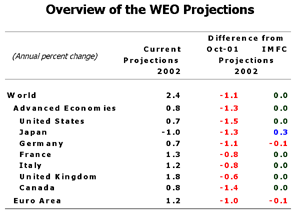
The same is true for the developing countries. The markdowns from the October WEO from many of the regions are not quite as large as the United States, which was minus 1.5 percent between the October WEO and the December WEO, but they were still very significant. And, again, the projections have been reasonably stable since the IMFC. 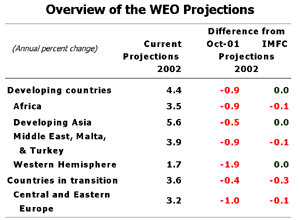
We normally present our numbers as year-to-year growth numbers, but particularly in times such as the present one, where there's very rapid change in the economy, it can be a little misleading in terms of expressing what our forecasts about the economy are. So I thought it might be helpful and you should have this in a handout that we have passed out, and it's available through our External Relations if you want an electronic copy. What I have here is a diagram giving in red what we call the headline numbers. Whether they are or not, these are the main numbers that have in the World Economic Outlook, which are year-on-year. In the blue, we have fourth quarter to fourth quarter. So for the United States, for example, it's 0.7 is our forecast for year-on-year growth for the United States. But actually that masks that underlying that we view there being solid recovery in the second half of 2002. But part of 2002 is spent digging--the economy is digging its way out of 2001. So if you look at the last quarter of 2002 and compare it with the last quarter of 2001, growth seems much stronger, 2.6 percent is what it is here, and the same is true, though to a lesser extent, of the other -- of the G-7, Germany and Japan. 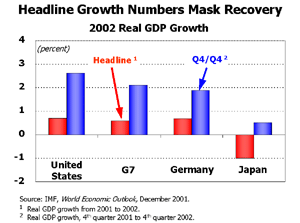
I also wanted to say a little bit about the global slowdown in perspective with earlier global slowdowns, and I'm going to turn to the next transparency. We use population --I'm sorry, purchasing power parity-weighted GDP. This tends to give a higher number than if you used market-weighted GDP. I think many of you are familiar with this. The purchasing power parity GDP that we've used for a long time is increasingly becoming the standard. I think it's a better measure of global welfare, deals better with non-traded goods than the standard market measure. The standard market measures are lower. You actually have them, some of them for global growth in Table 1. 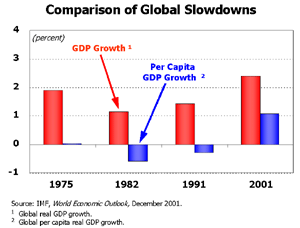
The red bar gives you the four major slowdowns that we've had starting in 1975, and as you can see by that measure, the 2.4 percent that we've had, that we're projecting for 2001 -- and it's also the same number for 2002 -- is slightly higher than it was in 1975 and somewhat more so comparing the '82 and '91 slowdowns. And that's probably familiar to you. Maybe something you haven't looked at before is comparing this with global population growth, which has been slowing, is the trend. And, for example, in 1975, global growth was 1.9 percent and global population growth was more or less also 1.9 percent. So per capita global GDP was flat in 1975. In 1982, the global growth was 1.1 percent and population growth was 1.7 percent. So per capita GDP was actually negative in 1982. You see the--if we just look at the red bars, you won't see a negative number in world global growth. But if you do per capita growth, there are actually some periods where it is negative, and 1982 is an example. 1991 is another example where global growth was 1.4 percent, and we had population growth still 1.7 percent. So, again, it's a smaller negative number, but it's negative. And looking at the current slowdown, global growth is 2.4 percent, but population growth is down a little bit, 1.5 percent. So net the per capita GDP is still growing. I don't want to infer that the current slowdown is not a very serious one. There are many regions of the world that are clearly in recession: the United States, Japan, Germany have had two negative quarters of growth. And there are many other countries that by many definitions of recession, you know, would be thought there. But the world includes countries such as China and India, which are very large and growing significantly. So compared to--by this measure, compared to the earlier slowdowns, particularly if we look at per capita GDP, this one is somewhat more mild. I want to show you one last graph which speaks a little bit to the issue of uncertainty. I remember when I came here just after September 11th, I spoke of uncertainty and I really meant it. And I probably -- whenever anyone's presenting forecasts, if they're not saying they're uncertain about them, you shouldn't be listening to them. But I think that this is a period still of greater than usual uncertainty. There are various measures of this. I'm going to show you one, which is really looking at private sector forecasters and the divergence of opinion. 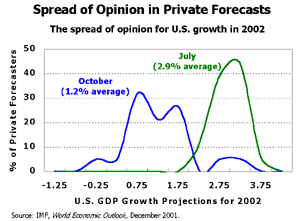
I'm going to focus on the United States. If I showed you a picture for the globe, it would, I think, tell a similar story. The diagram I have here, which maybe is not a familiar one to you, gives the spread of opinion of private sector forecasters. So this is looking at growth for the year 2002, and in July, the consensus forecast was 2.9 percent. That's the average of this green line. What you have over on the vertical axis is what percent of forecasters were calling for each point. So, for example, here we have -- I'm sorry, here we have 10 percent of forecasts -- I didn't draw that much better than my five-year-old. We have 10 percent of forecasters calling for this point and 10 percent here, and the mean is in between. That's a fairly typical looking spread for that time of year. As the year comes to a close, the spread usually narrows because, of course, we're forecasting for 2002, so the closer we get to the beginning of 2002, the more information we have, the spread should go down. Let's look at October. Well, it's hard to characterize these forecasts by much other than confusion. There are two humps, and they're actually almost a percentage point apart. This is among the private sector forecasts, and the spread is just remarkable. It's not only hasn't narrowed, you really can't speak meaningfully of a consensus forecast in this environment. You'll find this graph, incidentally, in the World Economic Outlook. You'll find this figure, a variation of this figure. Now, coming up to the present situation, this is December, and there are two things to notice. One, of course, is that the average has come down quite a bit from the relatively heady days of July when it was 2.9 percent. But, also, the spread is still very big. It usually is getting narrower and narrower. And compared to other Decembers, however --whatever weight you want to attach to the statistics, there's quite a bit of uncertainty still in the economy. That's significant not only from the point of view of forecasting, I think, but from a policy point of view. This uncertainty is significant. And we talk about this in the World Economic Outlook that our baseline forecast suggests global growth picking up by the second half of 2002 fairly solidly. It differs a bit across regions and some start earlier. But there's a range of uncertainty around this forecast, and it's not just -- I mean, I think that's somewhat reflected in these numbers. 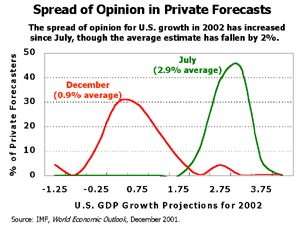
We can imagine that there would be a much better outcome, a much sharper recovery, and there are many reasons why you might think that was so. There are lower oil prices, a lot of policy stimulus in the pipeline, particularly from interest rates, reduced, somewhat reduced risk aversion, and at least at the moment somewhat more stable news on the conflict front. But, on the other hand, we can also imagine a worse outcome than we have in our baseline forecast. The World Economic Outlook gives you an alternative scenario that gives one example which combines a few of the factors that could get worse or stay worse having to do with business and consumer confidence and global risk aversion. There are many other potential sources of weakness in the world economy. So there is this very significant uncertainty. With that, I'll close my remarks and take your questions. QUESTION: [inaudible] MR. HACCHE: Could I ask you to wait for a microphone? Sorry. Go ahead. QUESTION: How do you account for the recent sharp declines of the rand? And also, you have reduced your 2002 growth projections for South Africa from 3.4 percent to 2.3 percent. How do you account for that? And given the recent appreciation of the rand ongoing, do you still stick by your 4.5 percent inflation forecast for next year? MR. ROGOFF: Good questions, and I'm naturally going to refer that particular one to Tam Bayoumi. MR. BAYOUMI: Well, thank you. As you say, the South African rand has depreciated quite rapidly. Indeed, since the beginning of September, it's fallen by over 30 percent against the U.S. dollar. Of course, this depreciation will help support activity in 2002, although it will complicate the achievement of the inflation target. The pressure on the rand appears to reflect a number of concerns, including the slowing of the privatization program and consequent slowing of capital inflows, the relatively rapid increase in some of the monetary aggregates, as well as a further deterioration in the situation in Zimbabwe. That said, the fundamentals of the country appear to remain very sound. The budget deficit is low. The current account is in surplus so far this year. The net open position of the reserve bank has fallen, and South African Government debt has recently been upgraded to investment grade status. All of this makes the size of the depreciation of the rand somewhat of a puzzle. Although one can understand the direction, the size of the depreciation does remain a bit of a puzzle. Turning to your question about the fall in the growth rate, this fall is caused in part by the events of September the 11th and consequent effects on both commodity prices and exports, export demand for South African goods. It isn't out of line with reductions from similar countries, and, therefore, I think that that's a fairly complete explanation. MR. HACCHE: The front row here. I think a microphone is coming. QUESTION: I'd like you to elaborate a little bit on Brazil. You are projecting much less growth for Brazil, especially next year, more inflation, but a better current account situation, it looks like here, if I interpret this right. And not being an economist, I find this a little bit surprising that you can have less growth, more inflation, and your current account situation--our external vulnerability seems to be less. Could you elaborate on that? MR. ROGOFF: Well, let me list a couple factors, which is we are projecting a pickup in the global economy, and there has, of course, been a substantial depreciation of the real, which has an effect both on inflation and also often with a lag on the current account. I'm just going to see if -- David, do you want to expand on that answer at all? MR. ROBINSON: I think that those are the key points, Ken. As for low growth, we've lowered our projections since IMFC only slightly, in part because of the worse than expected third quarter results and weak industrial production growth that we saw in October. And we've kept the projections for 2002 since IMFC about the same. In part, you know, Brazil will benefit from lower oil prices to some degree. In terms of the improved current account, as Ken said, the depreciation of the real is clearly important. Lower oil prices will help to some degree. And I suppose weaker growth also means weaker inputs. QUESTION: What do you make of the current appreciation of the real? MR. ROBINSON: Well, I think that the current appreciation of the real is one of the encouraging signs that we've seen of a disconnection of what's going on in Brazilian financial markets from Argentina. So I would actually view that as being quite a positive thing. We have seen some appreciation, as you've said, but nonetheless, the real is still considerably weaker than it was, let's say, at the beginning of this year. So I think it would still follow that there would be a positive impact on the current account for next year. MR. HACCHE: Thank you. In the front row here, please? QUESTION: Regarding Japan's macroeconomic policy, you said in the report that the further quantitative easing by the Bank of Japan should be pursued, even if such a policy were to result in some further depreciation of the yen. First, did you support the Bank of Japan's purchase of foreign bonds, as suggested by some of its officials in Tokyo? And could you elaborate why should we tolerate some further depreciation of the yen, about the implication for the other Asian economies? And would the yen's fall to 140 yen to the dollar, for instance, still be consistent with economic recovery in Japan and the rest of the world? MR. ROGOFF: Well, first of all, in terms of establishing some level of positive inflation again in Japan, this is a very serious problem that faces Japan. They have deflation. The costs of inflation and deflation at these low levels I think are quite asymmetric, having minus 2 percent deflation--it's minus 1 percent now in Japan, but having deflation is much worse than having a little bit of positive inflation. And some steps need to be taken to change that situation. Now, clearly, to achieve inflation, a time-honored approach has been to print money and buy something with the money. I don't think it's so important what the Bank of Japan buys. I don't think we take a strong stand on, you know, what they would purchase or particularly advocate. That's a decision of the Bank of Japan. But some way of increasing the money supply in a sustained, credible way is important. Now, that said, I think one has to acknowledge that it's not easy to move from the situation Japan is in now where there's slightly deflation, having slight inflation. There's a risk of overshooting, but I think that's a reasonable risk given the asymmetry between the costs of deflation and the costs of inflation. It's difficult to navigate from a situation where deflation is -- where you have positive deflation. In answer to your second question about depreciation of the yen, I think growth in the Japanese economy is something that would be healthy for the global economy, and an element of this has to be restoring some level of non-negative inflation. In Japan, probably, you know, 1 or 2 percent positive at least is necessary, and it's possible that that would have some implications for the yen. If the depreciation of the yen was a byproduct of a set of policies that led to growth in Japan, I think the benefits, particularly in the medium term, would outweigh the costs. It would be a good thing for the world economy, and obviously, you know, there are short-run issues that will vary from economy to economy. But, on the whole, I think that's a necessary part of the prescription for coming out of Japan's decade-long slowdown. QUESTION: How much further depreciation of the yen would be acceptable? MR. ROGOFF: I don't want to put a number on it, not simply from, you know, the point of view of being politically correct, but it really matters what the accompanying set of policies is and what it's consistent with. MR. HACCHE: Could we go to the second row there, please? QUESTION: In a box inside the WEO, you talk about fiscal stimulus in the U.S. and you go through all the different things that are under consideration and, from my reading of it, seem to shoot them all down as either not good for the U.S. or unworkable over the medium term. Are there specific fiscal stimuli that you think would be useful? And do you think there's enough room in monetary policy now in the U.S. to compensate for not having more fiscal stimulus? MR. ROGOFF: Let me speak first to your question about fiscal policy. It's certainly the case that sooner is better than later. Our projections call for growth in the United States really beginning already in the second quarter and strongly by the second half of the year. So certainly, you know, something that happens sooner will be better than something happening later. We also emphasize in the box, I think a central point is that fiscal stimulus which is temporary is more called for from a counter cyclical point of view than something that has lasting medium-term and long-term effects on the budget deficit. All of that said, a package which is good for long-term growth, you know, is certainly always welcome. But in terms of its counter cyclical effects, after a while it would--could be--if it's passed too late, it would be pro cyclical. MR. HACCHE: Thank you. In the front row here? QUESTION: I have two questions. One is I see that the projection for 2001 is 2.7, minus 2.7, and for 2002 it's minus 1.1. There is a little improvement. I want to know why. How do you calculate that? Second is if you could comment on the budget that Cavallo has introduced yesterday to parliament, if you think that it would comply with the zero deficit. MR. ROGOFF: Well, thank you for drawing attention to the box we have on Argentina, which is entitled "An Uphill Struggle to Regain Confidence," and it gives a detailed chronology of the events and difficulties that Argentina has faced, especially over the last couple of years, in its efforts to counteract these difficult -- now, it's primarily retrospective, not prospective. Let me just answer this question and anticipate one or two others by giving a brief executive summary. First of all, it talks about how starting in 1991 there was an adoption of the convertibility regime, which, in fact, led to a long period of high growth, low inflation, and important progress in structural reforms. However -- and this is where the box really goes into detail -- starting around 1999 deterioration began. The economy was weak. There was certainly also a weakening of policies and a difficult external environment, not least the depreciation of the real, and the strong U.S. dollar to which the Argentine currency was pegged. And authorities began a series of attempts at bolstering market confidence, including especially the zero deficit plan of July 11th. None of these had a lasting impact, and what happened is that loss of confidence about the long-term sustainability seemed to lead to ever higher interest rates on the debt, making fiscal balance more difficult. And the country had difficulty getting into a virtuous circle of gaining credibility, having interest rates drop, and making fiscal balance easier. And, of course, the IMF in August augmented Argentina's stand-by arrangement by $8 billion, but that, too, did not have a lasting effect, partly due to the low-growth environment, fiscal targets weren't achieved. You know, certainly the specifics of your last question would be the IMF is working with the authorities and, you know, welcome steps towards achieving a sustainable program. MR. HACCHE: The front row? QUESTION: A question on Russia. You project a rather dramatic decline. Russia is doing fine, so it seems, by your projections, but you are projecting a rather dramatic decline in the current account balance. So do you see that as a risk in the longer perspective? And, also, could you possibly touch on the issue of the risk of a new contagion in emerging markets? MR. ROGOFF: The growth projection for Russia is one which has fallen from the IMFC, and that's largely due to lower oil prices, being a very important part of Russia's exports and current accounts. Now, some of that lower oil prices may be transitory and there may be some movement upwards over the longer term. We have discussion in an appendix of the first chapter about contagion from emerging--to emerging markets, and particularly in the context of Argentina. And I think the general conclusion is that the contagion has perhaps so far been rather less than some had feared. Maybe a central reason for that is that it was anticipated to a significant extent, and certainly many studies show that the more credit problems are anticipated, the less there seems to be contagion. That's one of the elements. Anyway, the box discusses that in more detail. I was going to pause to see if, David, you want to add anything. MR. HACCHE: The second row, please. QUESTION: You said that ECB has room to lower interest rates further if necessary. Do you think it is necessary? MR. ROGOFF: Well, I think the risks are certainly asymmetric still in the euro area, and you certainly wouldn't want to raise interest rates, and I don't think anyone would accuse the ECB of having lowered interest rates too far too fast. That said, it's getting later in the game, and there's, you know, a difficult assessment. We are calling for recovery beginning into 2002. There are lags in monetary policy. Six to nine months, you know, is typically used in the United States, and, arguably, it's a little longer in Europe. Certainly the ECB needs to remain vigilant, and looking at inflation, there certainly is scope to cut the interest rate should the slowdown be more protracted than currently forecast. MR. HACCHE: The second row here? QUESTION: On Mexico, first of all, I would like you to clarify the GDP for 2001. I don't know if there is going to be negative growth or you don't have the precise figure at this point. And, also, you talk about the prospects for the next year, and you say that the early passage of a tax reform measure would further restrain fiscal sustainability and flexibility over the medium term. But at this point, there are no signs that the Congress is poised to approve the fiscal reform as the government has been asking for, and I wonder how, you know, a further delay in this issue could affect projections for next year. And, also, in some parts of the report, you mention that the decline in oil price could affect some countries. As you know, Mexico is one of the largest oil exporters in the hemisphere, and you don't seem to touch on that aspect in your projections. I mean, I wonder how a further decline in oil price could affect also the projections for the growth next year. MR. ROGOFF: The oil prices are incorporated in the Mexican projection, as, of course, the slowdown in the United States economy, and, as we say in the World Economic Outlook, Mexico's been relatively insulated by its macroeconomic policies and exchange rate policies thus far. Of course, if we're in the worst outcome than our baseline, then some of these issues that you raise I think would become more critical. I'm just going to see, David, if you want to add anything on Mexico. MR. ROBINSON: Well, maybe just to clarify, the growth forecast for Mexico is contained in Table 3.3 in the WEO. I got the impression from your question you weren't quite sure where it was. It's going from naught percent in 2001 to 1.2 percent in 2002, and a lot of that, of course, comes from the pickup in the United States economy, which has been one of the reasons why Mexico's growth has been so weak over the last year. On the issue of the tax reform and how we see that, well, obviously, the Mexican budget has to be passed, as I understand it, by the end of the year. And so there's less than two weeks for the Congress to reach agreement. I'm not really in a position to predict whether they will or whether they will not. You would probably know that better than me. We certainly hope that they do. If there were no tax reform, obviously that makes life more difficult on the expenditure side because the authorities are, rightly, I think, committed to keeping their 0.65 percent of GDP deficit target. And, actually, that's another consequence of lower oil prices, which was another part of your question. And as you probably know, the Mexican authorities have had to revamp the budget to take account of lower oil prices, and so it's another factor that will put pressure on expenditures if you're going to keep the target the same. So getting a solid tax reform in place is important, I think, for Mexico. I can't quantify to you how much that will mean for growth next year, but it would certainly make the conduct of fiscal policy considerably easier, both in the short run and I would say over the longer term. MR. HACCHE: Thank you. The second row here, please? QUESTION: I have two questions about Argentina. All the programs of the IMF to try to help Argentina have failed this year, and I want to know if you have a sort of mea culpa on that, if you think you failed your diagnosis in trying to help the country. And the second question is if you really think that Argentina can grow and maintain fiscal solvency within the framework of the convertibility regime. MR. ROGOFF: Well, it's clear that the mix of fiscal policy, debt, and exchange rate regime is not sustainable. The authorities recognize that, and this is also discussed in the World Economic Outlook. This is the, you know, subject of ongoing negotiations. I think everyone recognizes that, to a large extent, the problem lies in Argentina, and the solution is in Argentina, but the International Monetary Fund stands ready to help. And that's as much as I'm prepared to answer today. MR. HACCHE: Right at the back? QUESTION: If you look at page 70, where you give a longer history of global growth and advanced economies, et cetera, I want to ask about the synchronicity that you speak of. Are you satisfied with the policy response by the major economies to this slowdown thus far. That's the first element. Secondly, if you see that growth has gone all the way from at the height of the Asian crisis, global output was still 2.8 and you're projecting 2.4, what's your preliminary outlook for 2003 if you've got the advanced economies next year only at 0.8? And, finally, how do you compare this crisis, if that's the right word, with the Asian situation, crisis of '97, '98, '99? MR. ROGOFF: Well, you've packed a lot of questions in your question. Let me start with the policy response, and I think the global policy response among the industrialized countries has on the whole been quite admirable, although there are areas where it's been more deficient, and particularly looking at the United States and the response of the Federal Reserve Board with its extremely aggressive interest rate cuts in the face of both recognizing early, relatively early, the difficulties and responding relatively quickly. Now, one could question whether, try to second-guess whether some of the last couple 0.5 percent interest rate cuts should have been 0.25 percent interest rate cuts. But I think that's really difficult to second-guess. I would compare Alan Greenspan is to central bankers what Michael Jordan does to basketball, and he may miss a shot or two now and then, but when the game's on the line, you'd want him holding the ball. And I think the response really has been, you know, quite admirable. The ECB I think with hindsight was somewhat slower to recognize the slowdown coming, the knock-on effects on the U.S., but they have responded. And the situation in Japan, as I've already earlier responded, is quite difficult that the central bank needs to restore positive growth. I think fiscal policy has been not as much on center stage, although one has to recognize that in Europe the automatic stabilizers are more important. They're bigger economies, taxes and--I'm sorry. I misspoke. They're bigger governments as a percentage of the economies, so that taxes form a larger share of GNP, and that natural stabilizer is greater. You know, that said, because of this high degree of uncertainty that we still see, it's important that we remain vigilant. Looking forward to 2003, we certainly would project fairly strong growth. I mean, one of the ways that--because we project year-on-year growth, when the start of the year starts out slow in 2002, it makes it easier for 2003 to look good by comparison. So our baseline growth numbers for 2003 that we anticipate now are fairly strong. Obviously, there's uncertainty. Historically slowdowns do not--certainly in the OECD countries since 1945, have not tended to last very often more than a year. So there are a lot of reasons to be encouraged. And then, to keep quoting the World Economic Outlook -- but that is the point of this press conference -- in the last one we talked a lot about the technology revolution, and we're very optimistic about longer-term growth that might come from that. Finally, the Asian crisis, it's quite different because we don't see the synchronicity here, which your question alluded to. And I think we're sometimes asked if we ever see V-shaped recoveries. There really was in the Asian crisis, among most of the crisis countries, a very sharp recovery. And at this point that's a possibility still, but our baseline is certainly smoother than that. MR. HACCHE: Maybe a couple more. One in the front row, please. QUESTION: Making a third attempt at the growth in Argentina, there are the numbers, those numbers in Argentina, I understand that the latest projections of the mission are that the GDP will decline this year about 4 percent. And so that the projection of 1.1 next year decline even looks optimistic. I wanted you to comment on that. If you want and you can be specific on that, a more analytical question, a more analytical point is there is a debate in Argentina about which is the best way for long-term and sustainable growth [inaudible] trying to keep the current regime floating, the currency. What's your analysis to that? MR. ROGOFF: In answer to your first question about the growth numbers, we acknowledge in the WEO that there's a great deal of uncertainty, and more so in the case of Argentina, and there's a lot of uncertainty about the growth numbers. We acknowledge that. And in answer to your second question, you know, as I said before, the mix of fiscal policy, debt, and the exchange rate regime is clearly not sustainable. However, the choice of how to deal with this is one that is Argentina's choice, and so I don't here want to, you know, give more than that as an answer to your question. MR. HACCHE: In the third row there, please... QUESTION: The very last paragraph of the summary of the Acting Chair is kind of a masterful paragraph, on the one hand or on the other hand. Could you take an attempt at parsing that particular--the question of--it's an important question, as the first line of the paragraph says, but after that it gets a little muddy for me. MR. ROGOFF: Could you just read... QUESTION: The very last paragraph. It's a bit long for me to read it. It looks at the important question, the potential long-term impact of increased security concerns, and other stuff. MR. ROGOFF: Okay. We do have something on that. There's a box I can refer you to. There's sort of a question of September 11th and the increased security concerns, could that somehow dampen one's assessment of what longer-term growth is going to be. We've given reasons look at historical experience why one might be encouraged that the gains from the productivity, technology revolution will be sustained and ongoing. And there's a question of, you know, how much this could cut it back. I think it's speculative at this point, trying to guess. I mean, my gut instinct--and it's consistent with the calculations we do there--is that it's a small negative. But it's hard to make it into a big negative, the negative coming from increased trade costs, not just across borders but intra-nationally as well, higher insurance costs, firms might have to hold higher inventories because the far-flung production networks become a little bit more difficult to manage. Airline travel is less, et cetera. It's certainly something we're still thinking about. But on the whole it looks like the effects of September 11th are small. That said, it certainly increases the gains from further liberalization in trade because that directly counteracts at least part of the effects that we see in September 11th. So the higher these trade costs are, you know, the more gain there is to trying to reduce them some. I don't know if that covered everything in that paragraph, but I tried to answer the central point, anyway. MR. HACCHE: We'll take one last question from the second row. There, please? QUESTION: You have stated that the growth rate in India is significant in spite of the slowdown in the global economy. But this rate [inaudible] India as too low because it has been pointed out that in order to reduce poverty, India has to grow at 7 percent. I was wondering what your recommendations are in this respect? MR. ROGOFF: We certainly acknowledge that sustained growth in India is important for reducing poverty, and we talked about that in the last World Economic Outlook. So hopefully the slowdown that we're projecting is not a sustained one, that India as a more insulated economy has not felt it as much as some of the more open economies. But, nevertheless, for a number of reasons that we detail, there's been a slowdown there, you know, some good news, having weather and such, that's helping India. But, you know, of course, this is a concern, but relative to the rest of the world, India and China are doing well. MR. HACCHE: Thanks very much. We hope to see you here on Thursday at 9:30 for Tom Dawson's next briefing. |



